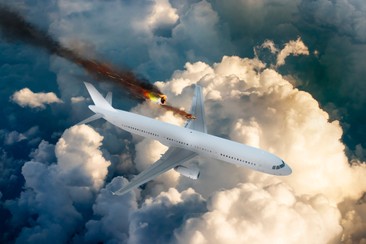Airline Liability in Planes Malfunctioning

An engine failure on a flight from Denver to Hawaii in late February 2021 has reignited a long-running discussion regarding airline liability due to a plane malfunction. Thankfully, the incident on United Airlines flight 328 out of Denver did not result in any reported injuries. The flight circled back and landed safely in Denver after one engine caught fire. Debris cascaded from the plane throughout the flight.
The fire resulted from a failing metal fan blade within the engine. It is believed the metal in the fan degraded over time, eventually snapping and causing the engine to catch fire. The plane in question—a Boeing 777—has had a troubled past with these issues in the past.
If you or someone you love was aboard an airplane during a serious malfunction, a discussion with an attorney could be in order. These malfunctions frequently lead to substantial legal claims against the airline, particularly when the injuries involved are serious.
Filing a Lawsuit Against a Domestic Airline
There have been countless lawsuits against airlines related to crashes, malfunctions, and mid-air disasters. Most of these claims stem directly from the injury or death of an airline passenger. Recovering compensation in these cases is possible by establishing that the airline’s negligence shared in the blame for the crash.
There are many different circumstances where airline negligence could result in a plane malfunction. For example, inadequate hiring or training practices could result in a mechanic failing to change an O-ring in an engine or inspect a fan blade for signs of fractures. Another example could see the airline failing to have enough staff on duty to ensure all of the necessary inspections and repairs are made prior to a flight taking off. In any of these cases, establishing that the airline was negligent can be central to recovering damages for a personal injury or wrongful death lawsuit.
Legal Claims Against Common Carriers
It is also worth noting that the burden of proof against an airline is substantially higher than with most negligence cases. This is because airlines are considered common carriers. A common carrier is a company that holds itself out for hire to transport members of the public. Other common carriers include taxi cabs and commercial buses.
The distinction of being a common carrier is broad under the law. For example, an airline does not have to offer open public booking in order to qualify as a common carrier. Charter airlines that only provide transport to limited numbers of individuals also count as common carriers for liability purposes.
A common carrier must adhere to the highest degree of care for their passengers. This burden is higher than the standard duty of care that must be met in most negligence cases. In other words, actions that might not typically qualify as negligence in most injury cases could qualify when committed by a common carrier.
When it comes to airplane malfunctions, the airline’s duty frequently involves a failure to adequately inspect the airplane before it takes off. There are strict FAA guidelines that airlines must comply with before a plane can take off. The failure to do so could result in a viable legal claim if a crash ensues.
Potential Damages
Most major cases involving plane accidents involve claims of severe bodily injuries or death. This type of case can bring substantial compensation related to medical bills, pain and suffering, and lost income experienced by the victims. The surviving relatives of these individuals could also have their own claims in some instances. For example, a loved one might be able to pursue a claim based on their loss of support they would have relied on during the rest of the victim’s life. It is worth noting that every state addresses the right of surviving relatives to pursue legal claims differently. In some jurisdictions, only the estate of the deceased person has the right to file a lawsuit. In other states, a surviving spouse or other close relatives might have the right to bring these claims directly.
The question of recovering compensation is not as clear for those airline passengers that did not suffer bodily injuries during the malfunction. Keep in mind, none of the passengers of Flight 328 suffered any form of bodily injuries. In cases like these, some states will not allow emotional distress damages without the presence of a corresponding physical injury. Other jurisdictions, on the other hand, will allow a claim for emotional distress resulting from negligence if the trauma experienced was severe. An exploding engine during a plane ride might qualify in some courts. An attorney could help explain whether or not the trauma you endured was enough to lead to a viable claim for compensation.
Treaties Govern the Right to Sue Following International Flights
In many cases, there are fewer options available for passengers during international flights. Circumstances that would allow for a passenger to pursue a civil lawsuit against a domestic airline might not be possible when the flight involved international travel. This is because international flights are governed not by state law, but by a series of international treaties.
These treaties, known as the Warsaw and Montreal conventions, impact the rights of passengers flying internationally to or from the nations that have signed on to the treaties. Hundreds of countries currently have signed on to these rules. While not all countries are signatories, most if not all flights in or out of the United States fall under these treaties.
These international treaties govern the liability airlines face on international routes. However, they are not a subset of statutes that apply under these specific situations. Instead, these treaties are considered “pass throughs.” In some cases, the language of the treaties will prevent a case from moving forward. In other cases that do qualify, the treaty will identify which domestic laws might apply under a personal injury claim. This means that if the treaties do not prevent your case from moving forward, your case can proceed in an American court in many cases.
One of the most important ways that a passenger’s right to sue is different with international flights relates to emotional distress claims. While many states might allow a lawsuit for emotional distress even a person does not suffer injuries, that is not the case for international flights. These treaties prevent legal claims against the airlines for mental anguish when that anguish is not tied directly to a bodily injury. Specifically, mental anguish claims are only permissible under these treaties in cases where passengers suffer death, bodily injury, or a physical manifestation of an injury.
Other questions remain regarding these cases, however. For example, it is unclear if mental anguish claims are viable if they are later preceded by the passenger’s death. In other words, it is unclear if psychological damages suffered prior to death could be included in a wrongful death lawsuit against the airlines.
Other Legal Options Available
It is not uncommon for lawsuits involving airline accidents or malfunctions to target the airline directly. After all, airlines are common carriers that have a high duty of care to their passengers. That might make pursuing a case against the airlines easier, it will not prevent a plaintiff from also seeking justice from the manufacturer or the faulty part.
In fact, manufacturers like Boeing are frequent targets of litigation following some crashes. Attorneys for the families that were killed in a Sriwijaya Air flight in January filed suit against Boeing in Illinois recently. They follow suit with the families of those killed in two fatal crashes in Ethiopia and Indonesia. In each of these cases, Boeing is blamed for defective parts that ultimately led to the fatal accident.
Pursuing a lawsuit for a defective product brings unique challenges. That said, these claims are frequently successful. Talk to an attorney about whether or not pursuing legal action against the plane’s manufacturer might be right in your case.
How The Marrone Law Firm, LLC Can Help
When it comes to your legal rights following an airplane malfunction, the strength of a potential legal case will depend largely on whether or not you suffered bodily injuries during the incident. That said, you should never assume that your situation does not call for legal action. You might be surprised at what your potential claim could be worth.
For that reason, you should speak to an attorney immediately if you are involved in an airplane malfunction. This is true whether the incident occurred while you were in the air or taxying on the ground.
If the prospect of taking on the airlines and their insurance companies seems overwhelming, that is understandable. The good news is that the Marrone Law Firm, LLC has a track record of success when it comes to facing down these large corporations and prevailing. Our team has the resources necessary to help you recover the compensation you deserve. Call right away to schedule your initial consultation.
Website: https://marronelaw.com/
Facebook: https://www.facebook.com/marronelawfirm/
Twitter: https://twitter.com/josephmmarrone Media Contact for Marrone Law Firm, LLC: Brigette Lutz, bl***@ma************.com

Marrone Law In Media




















